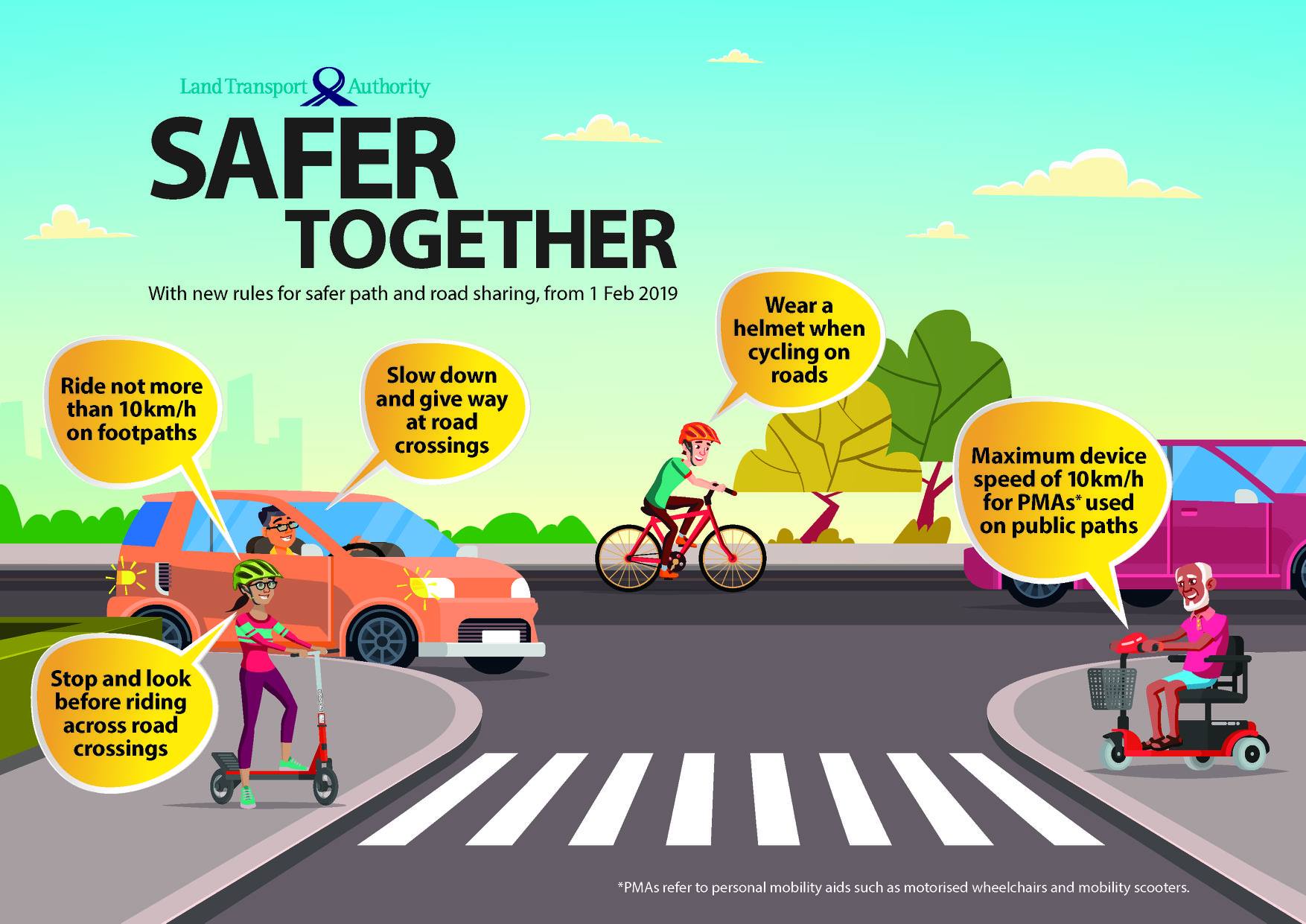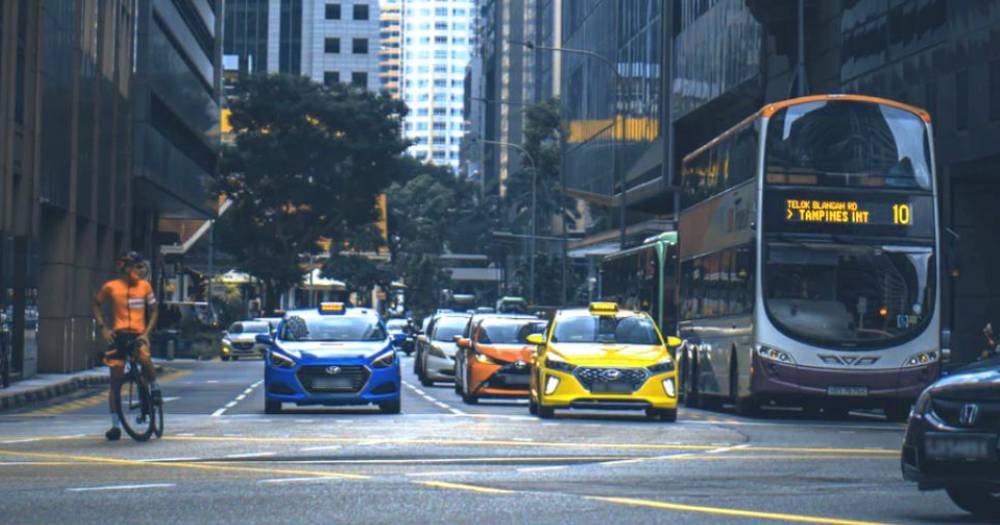As a driver, I admit I've not upheld the rules of the road all the time.
My various traffic offences range from innocuous (not wearing a seatbelt in the backseat, making an illegal u-turn when the roads were empty) to moderate (driving over the speed limit at 93km/h on the expressway, driving in the bus lane) and even egregious (trying to reply a text while driving, failing to squeeze past amber lights).
And when caught, I've paid my dues in the form of traffic fines and demerit points, which also serve as a reminder that I won't always get away with my offences.
But the temptation to flout the rules of the road as a cyclist is much stronger than when I'm driving.
I've often considered pedalling off at a pedestrian crossing once people have gotten across the road, before the lights change in my favour.
But such thoughts have never crossed my mind when I'm behind the wheel of a car.
While I'm no expert in psychology, I'm guessing that this has a lot to do with the odds of getting caught. Cyclists can, and do get away with a lot more on a bicycle as compared to drivers of cars and motorbikes.
There's also the question of what's at stake in both situations.
As a driver, it is the threat of accumulating demerit points and losing my hard-earned driver's license that creates the strongest deterrence against trying my luck at breaking a rule.
There is no such threat for cyclists, but I think there needs to be.
Road cyclists should be registered and licensed
I can't pretend to speak for the cycling community, but it's my humble personal opinion that registration and licensing for cyclists — but only the ones who ride on the roads — is the way forward.
Ever since actor Tay Ping Hui and Temasek CEO Ho Ching called for bicycles to be registered, a fresh wave of an ongoing debate about bicycles on the roads has been ignited among drivers and cyclists. There's even debate within cycling groups.
The Land Transport Authority (LTA) said in 2016 that bicycle licensing was "not practical", but it should be remembered that the agency was responding to proposals for all bicycles to be registered.
I'm not suggesting that at all.
Rather, I'm most concerned about the cyclists on the roads.
The inherent dangers of being on the roads, and their importance in facilitating daily life and commerce, explains why the behaviour of road users is so closely regulated.
The interaction between different users is quite different on the roads as compared to pavements; it cannot be left to give and take.
Registration, and a basic theory test for those who ride Power-Assisted Bicycles (PABs) on the roads are already being made a requirement, so why should road cyclists be exempted?
After all, the authorities have not shied away from imposing new requirements on those who cycle on the road — for example, the requirement that road cyclists must wear helmets and to have front and rear lights after 7pm.

Neither have they hesitated to impose requirements on all bicycles, as seen from the recent move to make brakes mandatory, just earlier this year.
How might cyclists be licensed?
Cyclists could be required to get a "road user's license", which includes passing a theory test (perhaps along the lines of the theory test for PABs) before they are allowed to ride on roads.
Even better, the authorities could go a step further and require all road users to take the Basic Theory Test (BTT), after making some small, but significant tweaks.
The BTT, a prerequisite for those seeking to be licensed as a driver, could be extended to PAB riders and road cyclists too, and could be expanded to include questions specifically pertaining to what bicycles and PABs can and cannot do.
This would do a lot in terms of laying down clear expectations on how cyclists are to behave on the roads, and do a lot of good for both cyclists and drivers.
Cyclists, not their bicycles, should be licensed
If the registration requirement is only imposed on those who want to cycle on the roads, as I'm suggesting, some might say that there is nothing to stop "black sheep" from getting bicycles, saying they will not ride on the roads, and then proceeding to ride on the road anyway.
Which is why I propose that it should be cyclists, and not their bicycles, which should be licensed.
PMDs and PABs need stricter oversight as they contain electrical components and batteries that can be fire hazards, but bicycles do not require such close scrutiny.
Thus, it would be simpler to require cyclists to have their registration numbers displayed prominently.
This could be done on their clothing/accessories, or on their helmets.
 Original images from Decathlon website and sawd10.sg on Shopee.
Original images from Decathlon website and sawd10.sg on Shopee.
And special penalties can be imposed for those who ride without a license, or ride without showing their license, just like what is done for cars and motorcycles.
Now that we have the "how", here's the "why". Or, in other words, the benefits of registration and licensing for road cyclists:
1. Identifying and eliminating "black sheep"
There shouldn't be any argument about this point: "Black sheep" — recalcitrant rule-breakers who disregard road rules at the expense of others' safety — should be taken off the road.
A registration scheme, complete with a requirement for cyclists to have unique license numbers (like those on the license plates of cars) would allow the authorities to identify rule-breaking cyclists more easily.
Enforcement against cyclists who break the rules can then be done the same way that the authorities currently enforce rules pertaining to all road users: cameras, roadblocks, spot-checks, and tip-offs from the public.
Repeated rule-breaking can also be dealt with by allowing the authorities to tabulate errant road cyclists' accumulated smaller transgressions (such as failing to signal, riding without lights at night) against them, and revoke licenses in serious cases — as is the case with drivers and demerit points.
This would also deter "minor" rule-breaking by cyclists, whether it helps to ensure that they ride with the required lights at night, or keep them from running red lights.
2. Channelling road users' anger to a productive outcome
With cyclists' licenses on the line, road users who encounter a "black sheep" can channel their frustration at errant cyclists toward a productive, positive outcome, instead of stepping up to penalise cyclists by putting them in danger.
I've encountered drivers who, aggrieved at a traffic offence I committed (or, perhaps just my presence on the road), resort to dangerous behaviour like overtaking while leaving as narrow a gap as possible, or overtaking and then suddenly braking.
In conversations with friends and acquaintances (before they find out I am a regular road cyclist), I often hear people paint road cyclists as unwelcome rule-breakers in one broad sweep, which isn't fair to the ones who are careful and abide by the rules.
Rather than try to convince drivers who think that way that "most cyclists are considerate people", I'd much rather they record the incident on their dashcams and submit the footage for the authorities to take action — if required.
3. Giving cyclists a license to ride
Many drivers do not think cyclists have a place on the road.
Cyclists who use the roads regularly can likely recall episodes of getting honked or shouted at, getting dirty looks, getting cut off even when they have the right of way, and so on, even when they were simply using the roads within the requirements of the law.
It's often been said that cyclists should not cycle on the road as they do not pay road tax. (The commonly-raised counter argument being that road tax is charged based on a car's carbon emissions, and since bicycles do not produce carbon emissions, they do not need to pay road tax.)
However, arguments on both sides do not directly address the underlying question: Do cyclists have a place on the road?
The definitive answer to that question:
 Cyclists are allowed on roads, subject to the roads' speed limits and other regulations, such as the requirement to wear a helmet. Screenshot from LTA website.
Cyclists are allowed on roads, subject to the roads' speed limits and other regulations, such as the requirement to wear a helmet. Screenshot from LTA website.
The fact that the road tax argument gets brought up again and again suggests that the authorities need to do more to reinforce the idea that the government permits cycling on the road.
Requiring cyclists to have a road user's license would literally give them a license to ride on the roads.
Won't it be against the government policy of promoting active mobility?
A new registration requirement can and should be kept as simple as possible, with one option being to unify it with the current driver's license system.
Yes, it would still be an obstacle to those who want to start cycling on the road, but the government should promote responsible active mobility, and not just active mobility at all costs. One way to do that is to ensure that riders who want to use the roads can be held accountable, should they break the rules.
Also, those considering the use of bicycles as a form of transportation are unlikely to start out on the roads. Imposing a registration requirement would not affect this group, nor the group of cyclists who ride on cycling paths, park connectors, and footpaths.
It's also worthwhile to consider the fact that as things stand right now, the current climate of animosity toward cyclists — particularly apparent online, but also on the roads — is a big deterrent to cyclists as well.
Licensing possibly the most feasible option
When it comes to the current impasse between drivers and cyclists, there has been no lack of well-meaning suggestions to improve the current state of affairs, including the extreme options of banning road cycling on one hand, and designating the leftmost lane of more (or all) roads as dedicated lanes for buses and bicycles on the other.
Thankfully, we are nowhere close to implementing either of these extreme suggestions.
With that in mind, licensing cyclists may look like a harsh move now, but it may well be the most feasible option among the ones that have been suggested.
Top image via Jeremy Kwok on unsplash
If you like what you read, follow us on Facebook, Instagram, Twitter and Telegram to get the latest updates.
